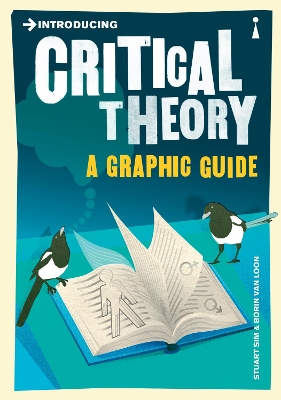
Briana @ Pages Unbound
Written on Jun 8, 2014
Introducing Critical Theory keeps readers on track by drawing lines between different schools of thought, frequently referencing what a particular school thinks of previous schools, and whether they are a response or reaction to any particular theorists. Generally, the book relates just about everything back to Marxism, which allows readers to get a basic idea of how critical theory developed chronologically.
The pictures also help hold reader attention. They are mostly for fun or perhaps may function as mnemonic devices. For instance, the page introducing post-structuralism might have some doodles of lamp posts on it. There are also frequent pictures of theorists themselves, occasionally with brief quotes that might further elucidate some of their beliefs. Readers will have to look closely, however, to see the tiny scrawled names identifying each person in the pictures.
On the negative side, Introducing Critical Theory is occasionally too general. It mentions a number of key terms, often bolding or otherwise highlighting them so readers know they are key, without adequately defining them. Sometimes, there is no attempt to define them at all. Readers should keep a search engine at hand, or make notes of words to research later. Also, the book is not always objective and sometimes offers opinions on the theories it is introducing. Now, some schools of thought may be “obviously” absurd, and these notes may actually help readers differentiate between schools that are popularly rejected or accepted by current theorists, but one does not really expect this type of biased commentary from an introductory book. Hopefully, readers who look further into the topic will later be able to draw their own opinions about which schools are valid and invalid.
Introducing Critical Theory nonetheless does a very good job at what it sets out to do. It makes critical theory accessible and mildly entertaining and should serve as a very good basis for those looking to learn more about critical theory. Personally, I plan to get a few more of these guides focused specifically on some of the theorists mentioned.
